Football Manager 2017 training guide: 4 essential tips to get your squad fit and firing
We all know it’s one of the least-loved – but most important – jobs of the management sim. So Simon Harrison has some advice for managers trying to get the ball rolling at a new club

Fitness in the summer? Maybe not...
It seems to be a go-to for some players – probably those who don’t spend their time trawling through forums and articles, admittedly – but changing your match training focus to ‘Fitness’ actually has no bearing on your players’ match fitness heading into a new campaign.
Instead it works on the physical attributes of your players, such as their strength, and other focuses such as ‘Attacking’ or ‘Defensive’ have the same match fitness effect over the course of pre-season.
If your team wants to play possession football, it might be best to go with technical training, for example, or an attacking focus for teams based on scoring plenty of goals. What has to be held in mind, however, is that the outfield squad members all follow the same regime – so working on attacking prowess might have no effect on your back four.
‘Ball Control’ is a fairly happy medium to choose to enhance your squad’s technical ability. You have to make sure that you leave your training focus set for a few months to see a noticeable difference.
If you’re worried about relegation, perhaps opt for ‘Defending’. After a busy summer, a few weeks of setting the main general training focus to ‘Team Cohesion’ can work wonders too.
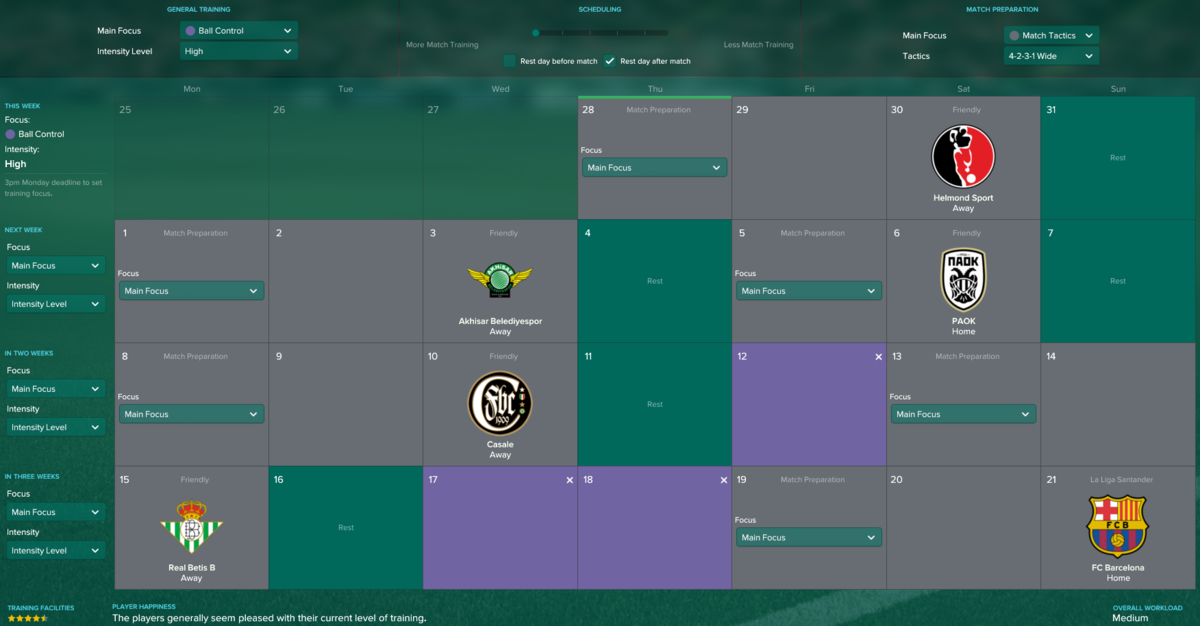
Focus on the individuals
Get FourFourTwo Newsletter
The best features, fun and footballing quizzes, straight to your inbox every week.
It’s important to know what exactly your players are working on. If you like to have your wingers set to roam infield and act as inside forwards, with your supporting full-backs doing the bulk of the work in getting service into the box, having your wide men working on perfecting their game as pure wingers probably isn’t the way to go.
By heading into the ‘Individual’ tab on the Training page, you can quickly look through what role your players are set to. If you’d like added versatility in your squad, perhaps sift through the core stats of each individual to see if they have the potential to be trained competently in another position entirely.
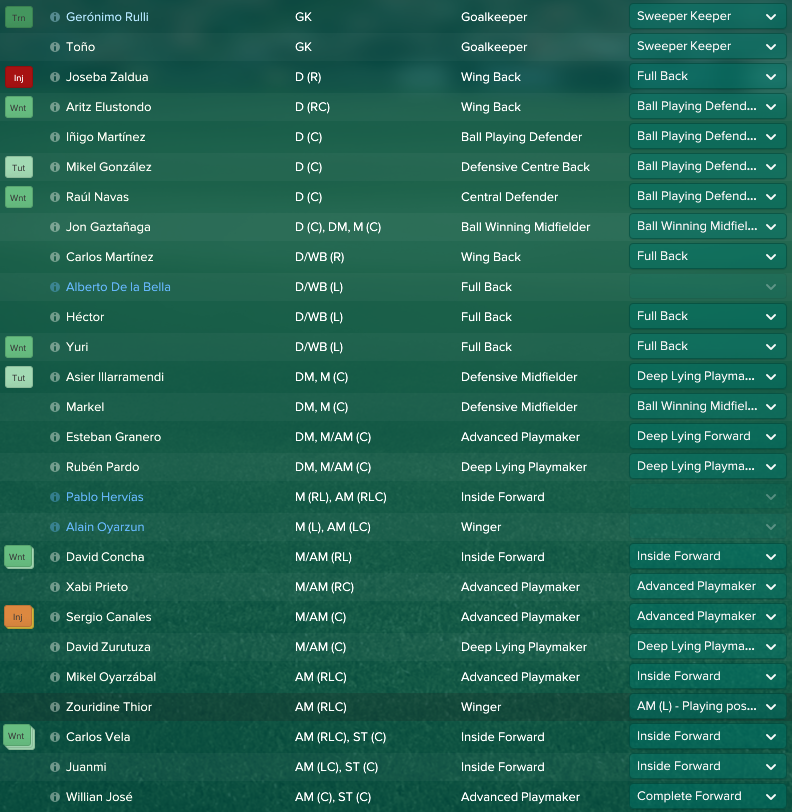
It’s definitely best to have two players working on each role within your main tactic – you never know when the injuries may strike. As an example of trying something new, in the pictured example we’ve reset Esteban Granero’s training to focus on his role as a deep-lying forward. He is creative and technically brilliant, but his legs don’t lend themselves to being a midfield engine anymore – so perhaps a position with less defensive responsibility is best.
Encouraging players to learn certain individual traits is important too, as it can really have an impact on what they seek to do in your system. In our example we took Yuri, a left-back, and set him to run with the ball down the left. You can set new player traits either in the ‘Individual’ tab of Training, or alternatively by going onto the player’s profile and selecting Training from his 'Development' tab.
Our system depends on full-backs pushing on, and Yuri has strong crossing attributes if he can get into the right areas. For an additional focus, Dribbling would be a key area we’d look to improve in the future, but you must be wary about asking too much of your players on the training ground – they will start to moan (footballers, really?) and could pick up injuries.
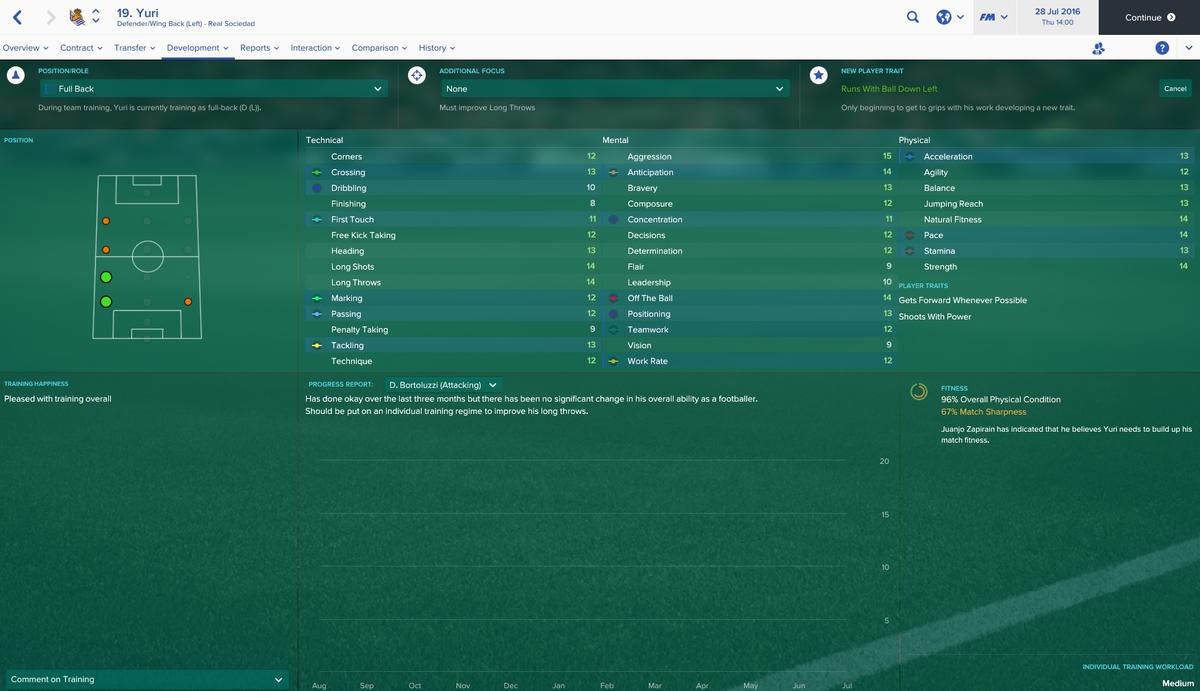
How to pick your staff
There are several key attributes that you should keep in mind when looking to pick up new staff upon arriving at a club. On top of wanting to get the best attribute available for their specialism – such as goalkeepers, defending, tactics or attacking – three other areas stand out.
Man Management, Working With Youngsters and Level of Discipline are important to ensure that your squad gets the best professional level of training possible. In the pictured example, Diego Bortoluzzi was a coach we settled for in order to secure the services of a tactics specialist.
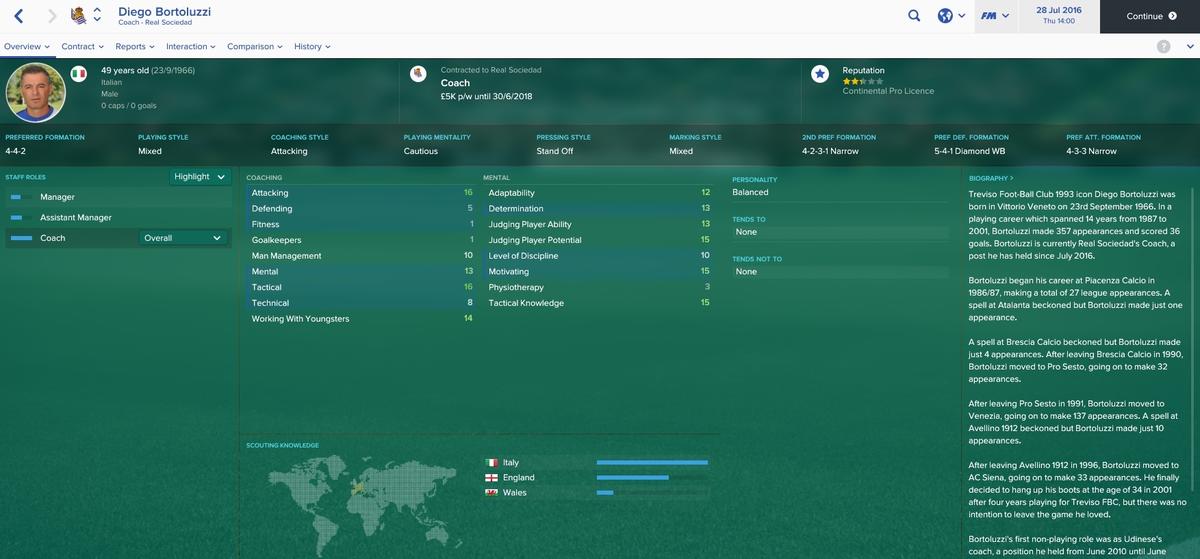
The Man Management and Level of Discipline attributes ensure that the standard of training will be high, while Working with Youngsters aids the training and development of any bright sparks who find themselves part of the first-team squad.
If you’re one for looking to sign teenagers or regens later in the game, this is a key thing to look for. Bortoluzzi doesn’t have the best people skills, but his strong 14 attribute for working with youth tipped the balance compared to the other coaches available at the time.
If possible, you want your coaches to conduct themselves well too, so keep an eye out for the Personality of your potential candidates. ‘Balanced’ is the standard – but look out for those who are ‘Model Professionals’. Paul Scholes is one you can find unattached at the start of your games.
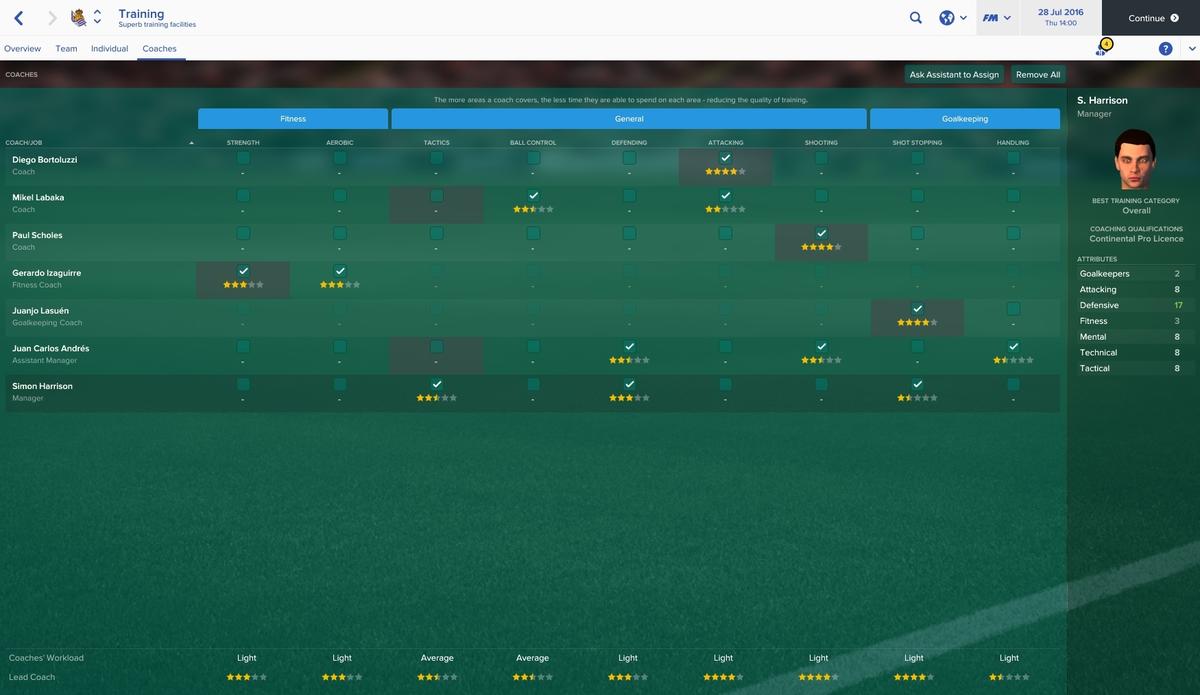
Get your tactics down to a tee
At the start of a managerial reign, or during troubled times where you may want to shake up your system, getting your system nailed isn’t an overnight process. On the Tactics screen, each player will have a bar which displays their tactical familiarity; often after a stylistic overhaul, not many players will be on the same page – or if they are, it’ll probably be the wrong one.
To deal with this issue, we again head to the ‘Team’ tab in the training section, but this time we want to check the scheduling and match preparation that your squad have been assigned.
In order to speed up the process, the slider for scheduling should be pushed all the way to ‘More Match Training’, but with ‘Rest Day after Match’ ticked to give the players a break after an intense week of work leading up to the big day.

For the focus of your match preparation, you should select ‘Match Tactics’ and then the relevant formation. Stick to this training schedule and play using your chosen style as much as you can, and the tactical familiarity bars should slowly start filling up with a lovely green colour.
Without this your group won’t be playing to their optimum level, so setting it up will save you (or at least ease) the pain of teething problems in the early stages of your campaign.
More Football Manager 2017...
- 7 ways to get the most out of Football Manager 2017 when you're short on time
- 8 signs you're addicted to Football Manager
- 10 of the best Football Manager 2017 release clauses you can't miss
- The 18 best coaches to snap up in Football Manager 2017
- 5 things you need to stop doing right now to win more matches on Football Manager 2017
- Explained: 7 ways to make sure you don’t miss Football Manager 2017's coveted wonderkids
- 10 of the best Football Manager 2017 youngsters you can grab for under £1m
- 8 brilliant Football Manager 2017 free transfers under the age of 23
- Quiz! What kind of Football Manager manager are you?
- Who are Football Manager 2017's 84 best wonderkids and why are they brilliant?
- What’s it like to scout for Football Manager? A Sports Interactive expert tells FFT
- 17 teams we can’t wait to be on Football Manager 2017
- Who to start with on Football Manager 2017? EVERY English league team's starting transfer and wage budget
- Football Manager 2017: Starting transfer and wage budgets in La Liga, Bundesliga, Serie A, Ligue 1
- Miles Jacobson: How we make Football Manager, the future – and where YOU come into it
- Football Manager 2017 review – definitely more than just a football game
- Football Manager 2017 tips: how to master the new game
- Remembered! The best Football Manager wonderkids of all time
